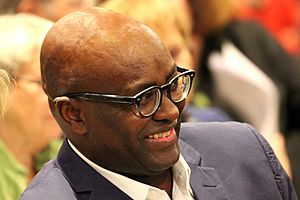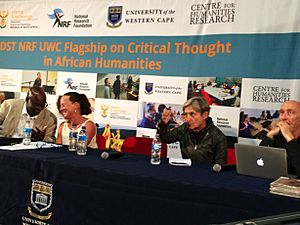Achille Mbembe facts for kids
Quick facts for kids
Achille Mbembe
|
|
|---|---|

Mbembe in 2015
|
|
| Born |
Joseph-Achille Mbembe
July 27, 1957 Otélé, French Cameroon
|
| Alma mater | Sorbonne Instituts d'études politiques |
| Spouse(s) | Sarah Nuttall |
| Awards | Geschwister-Scholl-Preis |
| Scientific career | |
| Institutions | University of the Witwatersrand, Duke University |
| Influences | Jean-Marc Ela, Fabien Eboussi Boulaga, Frantz Fanon, Michel Foucault, Bernard Stiegler, Hannah Arendt |
Achille Mbembe (born in 1957) is a famous historian and thinker from Cameroon. He teaches history and politics at the University of the Witwatersrand in South Africa. He is known for his ideas about colonialism (when one country takes control of another) and its effects. He is also a key person in modern French thinking.
Contents
About Achille Mbembe
Achille Mbembe was born in 1957 near Otélé in Cameroon. He earned his Ph.D. (a high university degree) in history from the Sorbonne University in Paris, France, in 1989. He also studied political science in Paris.
His Teaching Career
Mbembe has taught at many well-known universities around the world. These include Columbia University in New York and Yale University. He also worked at the Brookings Institution in Washington, D.C. From 1996 to 2000, he was the executive director of CODESRIA in Dakar, Senegal. This is a group that helps social science research in Africa.
In 2020, Mbembe gave a special lecture at Stanford University. He has also been a research professor at Harvard University.
His Writings and Awards
Mbembe has written many books about African history and politics. One of his important books is On the Postcolony. It was first published in French in 2000. The English version came out in 2001.
He has received several important awards for his work. On March 14, 2024, he was given the Holberg Prize. This award is for people who have done great work in arts, humanities, law, and theology.
Where He Works Now
Achille Mbembe is currently a staff member at the Wits Institute for Social and Economic Research (WISER). This institute is part of the University of the Witwatersrand in Johannesburg, South Africa.
He also visits the Franklin Humanities Institute at Duke University every year. He helps edit a scholarly journal called Public Culture.
His Main Ideas
Mbembe's main research areas are African history, postcolonial studies, and politics. Postcolonial studies look at the effects of colonialism after countries gain independence.
Understanding the Postcolony
His central work, On the Postcolony, talks about how people often have wrong ideas about Africa. He believes these ideas come from Western fears and fantasies. Mbembe argues that Africa is not just one place. Instead, it is a complex relationship between itself and the rest of the world. This relationship affects politics, minds, and culture.
Necropolitics: A New Idea
Mbembe also developed the idea of necropolitics. This concept helps explain how power works in modern times. He says that some powerful groups can decide who lives and who dies. This goes beyond just controlling people's bodies. He uses examples like Palestine to show how power can create "zones of death." In these zones, death becomes a way to show power or to resist it.
Mbembe has also studied the city of Johannesburg. He has also looked at the work of Frantz Fanon, another important thinker. He speaks out against the lack of democracy in Africa. He also calls for an end to French military bases in Africa.
His Family Life
Achille Mbembe is married to Sarah Nuttall. She is a professor of literary and cultural studies. She also directs the Wits Institute for Social and Economic Research in Johannesburg. They have written several texts together and have two children.
Awards and Honors
- 2015 Geschwister-Scholl-Preis for his book Critique de la raison nègre
- 2018 Gerda Henkel Prize
- 2024 Holberg Prize
- 2025 Spinozalens
See also
 In Spanish: Achille Mbembe para niños
In Spanish: Achille Mbembe para niños


